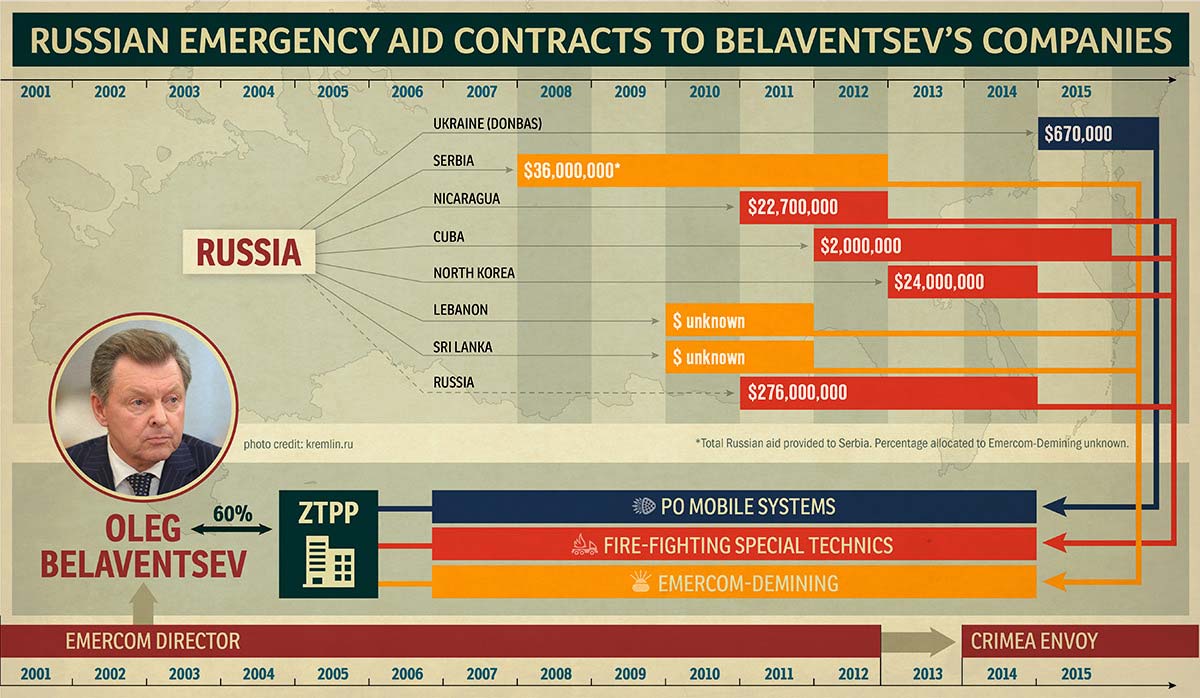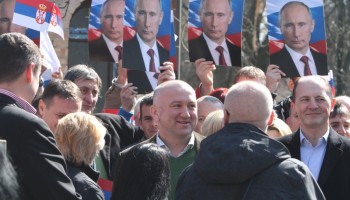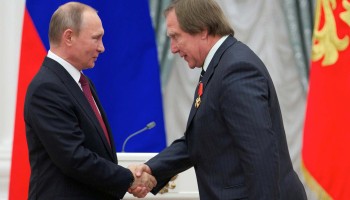The actual language used by the government of then-Prime Minister Margaret Thatcher was that he was engaged in “unacceptable activities” that “threaten national security.
In the waning days of the Soviet Union, such a high-profile scandal usually meant the end of a career, but not for Belaventsev. His star just kept rising.
For the last 20 years, Belaventsev has held important posts in the Russian government — from the deputy director of the main Russian arms trading agency to his current job as the special envoy of Russian Federation President Vladimir Putin in Crimea.
His appointment in March 2014 as Presidential Plenipotentiary Envoy to the Crimean Federal District, essentially the Kremlin’s top man in Crimea, reintroduced him to the Western world, which moved quickly to add him to European Union (EU) and US sanction lists of persons responsible for the Ukrainian crisis.
Reporters for Novaya Gazeta and the Organized Crime and Corruption Reporting Project (OCCRP) spent months investigating the new envoy’s other career — his international businesses built on Russia’s humanitarian programs all over the world, from Nicaragua to North Korea.
Belaventsev could be the poster boy for the phrase, “Doing well by doing good.”
His private companies, founded while he was heading the state agency responsible for humanitarian efforts, have won contracts to implement numerous Russian humanitarian projects abroad in recent years.
A legal expert says that at the very least, such a close connection appears to be a conflict of interest. Belaventsev and his partners have denied any wrongdoing in their written responses to OCCRP.
Belaventsev’s companies also prospered inside of Russia. He established a joint business to produce firefighting vehicles with Rosenbauer, a major fire-truck manufacturer and one of the biggest companies in Austria. This venture was previously connected to a controversial Russian businessman who US officials have said is associated with organized crime.
According to OCCRP’s calculations, this company, along with others owned by Belaventsev, received hundreds of millions of dollars in state contracts from different government agencies where he worked.
His companies have also picked up business from the war in southeast Ukraine: the Russian Ministry of Emergency Situations is buying food from Belaventsev’s companies for humanitarian convoys which go to the rebel-held area of Donbas along the eastern border with Russia.
Shady international cooperation
After the collapse of the Soviet Union, Belaventsev became the deputy head of the main Russian arms trader, Rosvooruzhenie. At that time he held the rank of vice-admiral of the Russian Navy.
In 2001, Belaventsev moved into a new arena, taking the helm at Emercom, the Agency for Support and Coordination of Russian Participation in International Humanitarian Operations at the Ministry for Emergency Situations. He held that post for the next 11 years. Emercom is not well known in the public domain even in Russia, because its operations are usually presented as projects of the Ministry for Emergency Situations. Nevertheless Emercom is one of Russia’s most important organizations because it manages all Russian humanitarian programs abroad.
Emercom and Iraqi oil
Emercom was one of several Russian companies which allegedly paid kickbacks Saddam Hussein’s regime for lucrative oil contracts while Iraq was under international sanctions. In 2004, the United Nations’ Kofi Anon appointed Paul Volcker as the head of a special Independent Inquiry Committee to investigate corruption in the UN “Oil for Food” program for Iraq. According to Paul Volcker’s report Emercom paid US $8.9 million in surcharge payments to Iraqi officials in the embassy of Iraq in Moscow. “The committee has obtained names of some of the individuals that brought cash on behalf of certain companies, including Emercom… The authenticity of Embassy receipts obtained by the Committee… was confirmed by former and current officials of the Iraqi Embassy in Moscow. All former members of the Embassy’s payment committee contacted by the Committee also confirmed the authenticity of their signatures on the surcharge payment receipts,” said the report.
Emercom denied any wrongdoings.
Since Belaventsev was appointed head of the agency, his career has closely tracked that of Sergey Shoigu, who was Minister of Emergency Situations from 1991-2012 and is now Minister of Defense.
For more than a decade, Belaventsev served under Shoigu at the Ministry of Emergency Situations as director of Emercom, which was created in 1996 to respond to natural disasters in Russia and abroad, and provide humanitarian assistance and demining services. Emercom has also been in charge of humanitarian convoys for Donbas since the start of the war in Ukraine.
In 2012, Shoigu for a short period became the governor of the Moscow region, and Belaventsev moved with him to lead the General Affairs Department of the Moscow Region Governor and Moscow Region Government.
Later that year, Shoigu was appointed Minister of Defense, and Belaventsev accompanied him once again to take up the post of general director of Slavyanka, one of the largest companies controlled by the ministry. Three senior officials from Crimea, who requested anonymity, told OCCRP that it was Shoigu who advised Putin to appoint Belaventsev as his envoy to Crimea.
It was during his time at Emercom, however, that Belaventsev laid the groundwork for what would become a lucrative business empire. Most of Emercom’s humanitarian projects abroad are conducted in cooperation with the International Civil Defense Organization (ICDO), created in 1931 by the French surgeon-general George Saint-Paul. The intergovernmental organization develops structures “for ensuring the protection and assistance of populations, and for safeguarding property and the environment in the face of natural and man-made disasters.”
Members of ICDO are mainly countries from the Third World, Africa and Central Asia. The only EU country which belongs to ICDO is Cyprus.
The current Secretary General of ICDO is Vladimir Kuvshinov, who used to work for Emercom under Belaventsev.
Russia is the biggest donor to ICDO, contributing US$ 42.6 million last year for different projects around the globe. Between 2008 and 2012, Russian contributions to ICDO totaled more than US$ 200 million, said the current Minister of Emergency of Russia Vladimir Puchkov.
Much of that money went to Belaventsev’s companies.
Demining operations: Serbia, Nicaragua, Sri Lanka, Lebanon
On July 4, 2008, when Shoigu was the Minister of Emergency Situations, he signed a memorandum of intent in Geneva with the previous Secretary General of ICDO, Nawaf Al Sleibi.
The Belaventsev Family Businesses
Belaventsev’s son, Alexey, and wife, Irina, are involved in the burial business. According to the Russian company register they both show up as shareholders in two companies each, all four of which have the same name VMK Memorial in different regions of Russia.. Three of these companies are now dissolved and only one is St.-Peterburgs is still active. VMK Memorial specializes in the burial of soldiers. According to Russian law, the funerals of soldiers is funded by the state. The partner of Belaventsev’s family in these companies is Valery Grachev, the son of ex-Minister of Defense of Russia Pavel Grachev.
After Oleg Belaventsev was appointed Vladimir Putin’s Presidential Plenipotentiary Envoy to the Crimean Federal District, his private business started to shift to Crimean shores. In September 2014 and April 2015 Belaventsev’s company ZTPP founded two subsidiaries in Sevastopol and Simferopol. The general director of both companies is likely Belaventsev’s son-in-law Egor Bliznov. In May 2015 Bliznov’s wife and Belaventsev’s daughter, Viktoria Bliznova, also established a hotel company, Fort, in Sevastopol. In October 2014 Belaventsev’s business partner and ex-subordinate from Emercom Tamara Mikhailova established a charity fund called Viktoria in Yalta.
Shoigu and Al Sleibi agreed that the Government of Russia would provide ICDO with a special contribution of US$ 6 million for demining in Serbia. The same memorandum said that Emercom would be responsible for the project on behalf of the ministry.
In 2008 Russian specialists demined the territory around the Constantine the Great Airport near Nis, Serbia. From 2009 to 2011, a Russian detachment working with the Mine Action Center of the Republic of Serbia (SMAC) demined areas around the Serbian town of Parachin in preparation for the planned South Stream gas pipeline.
The first phase of the Russian demining program ended in 2012, at a cost of US$ 36 million. In 2012 the program was extended until 2022; the new agreement was signed by Belaventsev as the head of Emercom and Petar Mihajlovic as the director of SMAC.
According to an official response of SMAC to OCCRP’s request, the demining operations are conducted by Emercom’s subsidiary Emercom-Demining, and all costs are paid from Emercom’s budget.
From SMAC’s letter it is clear that Serbian authorities believe that Emercom-Demining is part of Emercom the state agency.
But it is not.
When Emercom-Demining began working in Serbia in 2008, it was already a private company. Emercom-Demining had been a subsidiary of Emercom in the early 2000s, but shares of the company subsequently shifted to private hands.
According to the Russian Statistic Agency Rosstat, shareholders in Emercom-Demining were private individuals up until 2010. Because of a special form of ownership of Emercom-Demining, the names of these shareholders were kept in a closed register and not reported. OCCRP could not identify who owned the company before 2010.
But Rosstat shows that since 2010, when the first part of the demining operation in Serbia was still ongoing, more than 90 percent of the company was owned by Zarubezhtehcomproekt (ZTPP), another Russian entity controlled by five individuals. ZTPP’s register of shareholders from the company’s founding in 2006 identify the ultimate owners of Emercom-Demining.
Among them are: Belaventsev, by that time the head of the state agency Emercom, with 60 percent; Alexander Mordovskiy, who replaced Belaventsev as director at Emercom in 2012, with 10 percent; Tamara Mikhailova, general accountant of Emercom, with 10 percent; and Sergey Ivanov, Belaventsev’s first deputy in Emercom.
So the money for demining operations in Serbia took a long route from the Russian government to ICDO, and finally ending up in the pockets of Emercom officials. Their names, together with Belaventsev, appear in other governmental agencies and in other private companies which received hundreds of millions of dollars from these agencies.
The current director of Emercom, Alexander Mordovskiy, came to the agency from Emercom-Demining. In 2010, he became Belaventsev’s deputy and in 2012 replaced him as the director. In his letter to OCCRP, Mordovskiy claimed that according to Russian laws, the director of a state agency is not a state official and he is not prohibited from engaging in commercial business. Nevertheless, when appointed the director of Emercom, Mordovskiy said in an email to OCCRP that he voluntarily decided to get rid of shares of ZTPP to avoid any possible conflict of interest.
OCCRP checked his claims and found that Russian law states that not only directors, but also deputies in state agencies are subject to conflict of interest regulations. And thus while Mordovskiy worked as Emercom’s deputy director his private company profited from Emercom’s operations. But Mordovskiy insisted that he never got any dividends from ZTPP and today has no relationship to the company or its subsidiaries.
Serbia was not the only place in the world where Belaventsev’s Emercom-Demining did business. According to its own website the company was conducting demining operations in Sri Lanka and Lebanon from 2010 until 2011, and in Nicaragua from 2009 until 2014. All of these projects were sponsored by the Russian government through ICDO and managed by Emercom.
A representative of the Ministry of Emergency Situations wrote that neither the Ministry nor Emercom signed direct contracts with Emercom-Demining. “In the operations you mentioned all the services were paid within the contract with the international organization,” the representative wrote. Mordovskiy also confirmed that the payer was an “international organization.” The secretary general of ICDO, Kuvshinov, hasn't responded to OCCRP’s request for comment or information.
A Dodgy Business
Since 2011, Russia has been helping Nicaragua create a national system to prevent and control emergencies. The program, like others, was financed by the Russian government through contributions to ICDO. The total budget of the project was US$ 26.6 million.
Offshore interests
In 2014, Russian President Vladimir Putin started a campaign against offshore companies by signing a number of orders and laws to stop the outflow of Russian capitals to the tax havens. Despite this, Putin’s envoy in Crimea, Oleg Belaventsev, used offshore companies in his business. From 2010 until May 2012, Oleg Belaventsev was the only shareholder of a Cyprus company Kerdoessa Ltd. In May 2012, when Belaventsev was appointed the Head of the General Affairs Department of the Moscow Region Governor and the Moscow Regional Government, shares of Kerdoessa were transferred to his daughter Viktoria Bliznova. When acquiring the shares of Kerdoessa, Bliznova listed her home address in a luxurious community of villas called Kiti Beach Gardens, which is located on the coast of Mediterranean sea in Meneou, a village in Larnaca district of Cyprus.
Daniel Ortega, president of Nicaragua, asked for additional help, and Russian authorities agreed to supply Nicaragua with firefighting vehicles and field medical hospitals worth US$ 26.5 million. This money went directly to Belaventsev as well.
According to Russian customs data, in 2011 and 2012 a Moscow-based company called Fire-fighting Special Technics supplied 47 firefighting vehicles to the General Command of the Army of Nicaragua at a cost of US$ 22.7 million.
According to Rosstat, 51 percent of Fire-fighting Special Technics is controlled by the same Russian company, ZTPP, whose owners include Belaventsev and former and current Emercom officials.
The other 49 percent belongs to one of Austria’s biggest companies, firefighting equipment manufacturer Rosenbauer. The director of Fire-fighting Special Technics is Egor Bliznov, who is most likely married to Belaventsev’s daughter, Victoria.
A representative of Rosenbauer told OCCRP that “in 2008 the Russian [Ministry of Emergency Situations] has had intentions to modernize the existing firefighting technology in Russia and was looking for a qualified supplier to provide such improvements to the [Ministry’s] firefighting organization. We set up a production joint venture in Moscow in 2009. The aim of the joint venture is to supply the Russian market with fire-fighting vehicles that are fitted out with high-quality components from Rosenbauer, while trying to increase the local value-added content.”
The Rosenbauer representative said that their first partners in Russia were “ZTPP with Oleg Belaventsev and the Moscow Automotive Company (MAC)”.
At that time, Belaventsev’s ZTPP controlled 10 percent of Fire-fighting Special Technics, while the other 90 percent was split equally between Rosenbauer and MAC. MAC’s shareholding structure led OCCRP to a controversial figure believed by the US authorities to work for the KGB and Russian organized crime simultaneously.
Until 2011, MAC was a managing company for the Lichachev Plant, or ZiL, one of the biggest manufacturers of cars and trucks in Russia. Fire-fighting Special Technics rented ZiL’s workshops where it equipped heavy Russian KAMAZ trucks with Rosenbauer’s fire-fighting equipment.
Records from Rosstat show that MAC was owned by a company with a board of directors headed by Grigory Luchansky. Luchansky was also listed as a board member at the Lichachev Plant.
In 1995, Grigory Luchansky met with then-US President Bill Clinton at a Democratic Party fundraiser, drawing the attention of the US press and the House of Representatives. In 1996, then-director of the CIA John Deutch called Luchansky’s company Nordex “an example of an organization associated with Russian criminal activity moving out of Russia.”
A year later, the chairman of the House Committee on International Relations asked FBI Director Louis J. Freeh: “Is there any evidence that former KGB officials are involved in the Russian organized crime syndicates?”
“Yes, sir, there is; both in investigations in Russia, as well as in other parts of Europe, in companies such as Nordex, which is a Vienna-based company, a multinational company. There are strong indications of former KGB officers working directly with some of these organized crime groups, and that poses an additional level of threat and sophistication to these people,” Freeh answered.
Asked by OCCRP whether Luchansky was their partner in Fire-fighting Special Technics, Rosenbauer’s representative replied that they don't have “concrete, confirmable information about the ownership structure of Moscow Automobile Company.”
Luchansky refused to discuss these issues in detail. In a call to Novaya Gazeta, he claimed that he was not connected to MAC and that Nordex was closed in 1998 and thus could not establish any companies in 2008. Luchansky said he assumed somebody might have used his name.
Belaventsev said that he had no business relationships with Luchansky.
Reporters for OCCRP asked Ross Denton, a partner at the international law firm of Baker & McKenzie LLP, for his assessment of such behavior. Denton, who stressed that he was speaking hypothetically, said he saw several potential problems with a situation like Belaventsev’s.
For one thing, state officials should not have personal financial interests in state contracts that they can influence, he said. “You could imagine a situation where this guy … was just saying ‘the contract needs to go to my company’,” Denton said. “At the very least, it’s a conflict of interest.”
And for another, it may not be legal for an EU firm to form a joint venture with a Russian official who is under sanctions, he said.
Citizens of the EU are not supposed to either directly or indirectly assist sanctioned officials, Denton noted, but added that if the joint venture were registered in Russia, it would also have certain obligations to its Russian shareholders.
“So they (would) kind of just have to put their hands up in the air and say, ‘we can’t do anything.’ Certainly under EU or US law, they can’t take a positive decision to assist that company,” Denton said.
But Gerda Koenigstorfer, a Rosenbauer representative, doesn't see any conflict of interest in the fact that their partners were managers of the state agency which coordinated projects where Rosenbauer’s subsidiary made significant money. “The Rosenbauer Code of Conduct meets all requirements from Austrian, European and US anticorruption laws and is internally monitored by our compliance department as well as externally audited by the Austrian Standards plus Office,” she said.
As for sanctions, according to Rosenbauer, Belaventsev doesn’t have any ownership in Fire-fighting Special Technics today. This contradicts the official records from Rosstat, although information about current shareholders may not always be up to date. Belaventsev’s likely son-in-law, Egor Bliznov, however, is still the director of the company. Rosenbauer did not comment on these family connections.
Nicaragua is not the only country where Fire-fighting Special Technics supplied vehicles as part of Russia’s international humanitarian aid. Since 2012, the Ministry of Emergency Situations has been developing a center for fire-fighting specialists in the Cuban capital of Havana.
The center was sponsored through a Russian government contribution to ICDO and managed by Emercom. Yet again, Belaventsev’s private company benefited from this project.
According to Russian customs data, Fire-fighting Special Technics sent three Rosenbauer vehicles to Cuba valued at US$ 2 million.
Earlier this year, Russia’s deputy foreign minister Igor Morgulov said: “In 2014, we sent 50,000 tons of wheat to North Korea on a pro-bono basis. We also dispatched 50 Russian-made firefighting vehicles to the country last April within the International Civil Defence Organization”.
Customs data show that yet again these vehicles were delivered by Fire-fighting Special Technics. In 2013, the company dispatched 20 vehicles and in 2014, the remaining 30.
These contracts brought Belaventsev’s company almost US$ 24 million.
Lucrative contracts in Russia
Since its founding in 2008, Fire-fighting Special Technics has mostly depended on state money. The company made its first money in 2009, according to financial reports: US$ 8.7 million (excluding taxes). According to the procurement database of Russia, this sum came from a state contract with the Ministry of Emergency Situations. On Aug. 7, 2009, Fire-fighting Special Technics won a bid to deliver 24 firefighting vehicles to the ministry. The vehicles were inspected and approved by the Minister of Emergency Situations, Shoigu.
Beleventsev’s company was the sole bidder, and according to Russian law got the contract at a maximum price of US$ 10 million. Without tax, it would be almost the whole revenue of Fire-fighting Special Technics for 2009.
Over the next six years, the Russian state provided virtually all of Belaventsev’s company’s income. Records show that between 2011 and the present, Fire-fighting Special Technics was awarded 10.2 billion rubles (US$ 280 million); the total revenues of the company from 2011 till 2014 totaled 10 billion rubles (US$ 276 million).
Most of these contracts were awarded to Fire-fighting Special Technics without any competition at the maximum price, and most (about 8 billion rubles or US$ 221 million) came from the Ministry of Emergency Situations.
Belaventsev did pick up some other business from connections made during his comparatively brief stint outside the ministry.
When Belaventsev left Emercom to follow Shoigu to the Moscow region, he headed the General Affairs Department of the Moscow Region Governor and Moscow Region Government from May 2012 until Dec. 24, 2012. Just a couple of weeks before leaving this post, two agencies of the Moscow region government signed a number of state contracts with Fire-fighting Special Technics for about 200 million rubles (US$ 6.5 million).
One of the agencies – the Supply Department of the Moscow region – was directly controlled by Belaventsev’s General Affairs Department.
Since Belaventsev arrived in Crimea, the contracts have continued to roll in. In 2015 another Belaventsev company, PO Mobile Systems, won two sole-bidcontracts from Emercom worth more than US$ 670,000. PO Mobile Systems’ sole shareholder is ZTPP. PO Mobile is delivering rye flour to the rescue squads of the Ministry of Emergency Situations in the Rostovskaya region of Russia. Russian news agencies reported that humanitarian convoys to Donbas operated by Emercom were assembled at the bases of these rescue squads.
The contracts were signed by the current director of Emercom, Alexander Mordovskiy. He was also one of the ultimate shareholders of PO Mobile Systems.
The representative of the Ministry of Emergency doesn’t see any conflict of interest in this deal, since Mordovskiy is no longer a shareholder in ZTPP. Mordovskiy himself told OCCRP that he didn't help the private company get state contracts.
Belaventsev in his response claimed that while he was the director of Emercom, he was not a public servant. Belaventsev said in this status, he did business with his private companies but he followed Russian law and avoided any conflicts of interest. “As the director of Emercom I didn't sign contracts with Emercom-Demining and Fire-fighting Special Technics and didn't help them to get state contracts,” Belaventsev wrote. Belaventsev said when he became a public servant he got rid of his shares. The register of shareholders from 2014 provided by Rosenbauer show Belaventsev’s daughter Victoria then controlled 70 percent of ZTPP which she acquired sometime before 2014 – the exact date is not clear because the records are not public.
Ilya Shumanov from Transparency International-Russia said activities of a state agency like Emercom are regulated by the NGO law. “In this law there is an article about conflict of interest. It says that if the director of the agency has private companies and the agency signs contracts with them, then such deals are considered to be with an interested party. The same is true if the private companies are owned by relatives of the director,” he said. According to Shumanov if such deals are not officially approved on the ministry level, they could be found to be not legal.
But Belaventsev’s case is difficult. Despite the fact that his private companies benefited from Emercom operations, the money may have formally came from the international organization, ICDO but OCCRP could not obtain the contracts and could not be sure who formally hired Belavantsev’s company.
A week ago its director, Vladimir Kuvshinov, visited Russia and agreed with the Ministry of Emergency Situations to expand the delivery of firefighting and rescue equipment to Europe and countries of North and South America. This means that Belaventsev’s empire will continue to prosper.
Additional reporting by Eleanor Rose, OCCRP.







